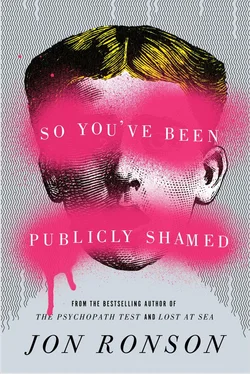Then Raquel said, “Miss Blake, is this really happening?”
And Miss Blake nodded.
• • •
I got a call from Michael Fertik’s people. They were ready to start on Lindsey Stone.
Fourteen.Cats and Ice Cream and Music
Are there any hobbies you’re particularly passionate about right now? Marathons? Photography?”
Farukh Rashid in San Francisco was talking on a conference line to Lindsey Stone. I was listening in from my sofa in New York.
I’d met Farukh a few months earlier when Michael’s publicist, Leslie Hobbs, gave me a tour of the Reputation.com offices — two open-plan floors with soundproofed booths for sensitive calls to celebrity clients. She introduced me to Farukh and explained that he usually works on Michael’s VIP customers — the CEOs and celebrities.
“It’s nice that you’re giving Lindsey the bespoke service,” I said.
“She needs it,” Leslie replied.
She really did. Michael’s strategists had been researching Lindsey’s online life and had discovered literally nothing about her besides that “silence and respect” incident.
“That five seconds of her life is her entire Internet presence?” I said.
Farukh nodded. “And it’s not just this Lindsey Stone. Anyone who has that name has the same problem. There are sixty Lindsey Stones in the U.S. There’s a designer in Austin, Texas, a photographer, there’s even a gymnast, and they’re all being defined by that one photograph.”
“I’m sorry to have given you such a tricky one,” I said, feeling a little proud of myself.
“Oh, no, we’re excited,” Farukh replied. “It’s a challenging scenario but a great scenario. We’re going to introduce the Internet to the real Lindsey Stone.”
“Are cats important to you?” Farukh asked Lindsey on the conference call.
“Absolutely,” said Lindsey.
I heard Farukh type the word cats into his computer. Farukh was young and energetic and just as upbeat and buoyant and lacking in cynicism and malevolent irony as he was hoping to make Lindsey seem. His Twitter profile said he enjoys “biking, hiking, and family time.” His plan was to create Lindsey Stone Tumblrs and LinkedIn pages and WordPress blogs and Instagram accounts and YouTube accounts to overwhelm that terrible photograph, wash it away in a tidal wave of positivity, away to a place on Google where normal people don’t look — a place like page two of the search results. According to Google’s own research into our “eye movements,” 53 percent of us don’t go beyond the first two search results, and 89 percent don’t look down past the first page.
“What the first page looks like,” Michael’s strategist, Jered Higgins, told me during my tour of their offices, “determines what people think of you.”
As a writer and journalist — as well as a father and human being — this struck me as a really horrifying way of knowing the world.
“I’m passionate about music,” Lindsey told Farukh. “I like Top 40 chart music.”
“That’s really good,” said Farukh. “Let’s work with that. Do you play an instrument?”
“I used to,” Lindsey said. “I was kind of self-taught. It’s just something I mess around with. It’s not anything I…” At first, she’d sounded like she’d been enjoying the fun of it all, but now she seemed self-conscious, like the endeavor was giving her troubling existential thoughts — questions like “Who am I?” and “What are we doing ?”
“I’m having a hard time with this,” she said. “As a normal person I don’t really know how to… brand myself online. I’m trying to come up with things for you guys to write about. But it’s hard, you know?”
“Piano? Guitar? Drums?” said Farukh. “Or travel? Where do you go?”
“I don’t know,” Lindsey said. “I go to the cave. I go to the beach. I get ice cream.”
At Farukh’s request, Lindsey had been e-mailing him photographs that didn’t involve her inadvertently flipping off military cemeteries. She’d been providing biographical details too. Her favorite TV show was Parks and Recreation . Her employment history included five years at Walmart, “which was kind of soul-suckingly awful.”
“Are you sure you want to say that Walmart was soul-sucking?” Farukh said.
“Oh… What? Really?” Lindsey laughed as if to say, “Come on! Everyone knows that about Walmart!” But then she hesitated.
The conference call was proving an unexpectedly melancholic experience. It was nothing to do with Farukh. He really felt for Lindsey and wanted to do a good job for her. The sad thing was that Lindsey had incurred the Internet’s wrath because she was impudent and playful and foolhardy and outspoken. And now here she was, working with Farukh to reduce herself to safe banalities — to cats and ice cream and Top 40 chart music. We were creating a world where the smartest way to survive is to be bland.
• • •
There was a time when Michael Fertik wouldn’t have needed to be so calculating. Back in the mid-1990s search engines were interested only in how many times a particular keyword appeared within a page. To be the number-one Jon Ronson search term on AltaVista or HotBot, you just had to write “Jon Ronson” over and over again. Which for me would be the most fantastic website to chance upon, but for everyone else, less so.
But then two students at Stanford, Larry Page and Sergey Brin, had their idea. Why not build a search engine that ranked websites by popularity instead? If someone is linking to your page, that’s one vote. A link, they figured, is like a citation — a nod of respect. If the page linking to your page has a lot of links into it, then that page counts for more votes. An esteemed person bestowing their admiration on you is worth more than some loner doing the same. And that was it. They called their invention PageRank, after Larry Page, and as soon as they turned the algorithm on, we early searchers were spellbound.
This was why Farukh needed to create LinkedIn and Tumblr and Twitter pages for Lindsey. They come with a built-in high PageRank. The Google algorithm prejudges them as well liked. But for Michael Fertik, the problem with Google is that it is forever evolving — adjusting its algorithm in ways it keeps secret.
“Google is a tricky beast and a moving target,” Michael told me. “And so we try to decipher it, to reverse engineer it.”
This was what Michael knew right now: “Google tends to like stuff that’s old. It seems to think old stuff has a certain authority. And Google tends to like stuff that’s new. With the intervening stuff, week six, week twelve, there’s a dip.” Which was why Michael’s people predicted that Lindsey’s love of cats or whatever would achieve “initial strong impact,” followed by “fluctuation.” And after fluctuation: “reversion.”
Michael’s clients dread reversion. There’s nothing more dispiriting than seeing the nice new judgments disappear down to page two and the horrific old judgments bubble back up again. But reversion is actually their friend, Jered Higgins told me. Reversion is when you think Glenn Close is dead but she suddenly leaps up in the bath, apparently filled with a new violent fervor, but really she’s muddled and wounded and vulnerable.
“Reversion shows that the algorithm is uncertain,” Jered said. “It’s the algorithm shifting things around and wondering what, from a mathematical standpoint, is the story that needs to be told about this person.”
And during this uncertainty, Jered said, “we go in and blast it.”
The blasting — the bombardment of the algorithm with Tumblr pages about Lindsey’s trips to the beach, the shock and awe of these pleasant banalities — has to be choreographed just right. Google knows if it’s being manipulated. Alarm bells go off. “So we have a strategic schedule for content creation and publication,” Jered said. “We create a natural-looking activity online. That’s a lot of accumulated intelligence.”
Читать дальше












